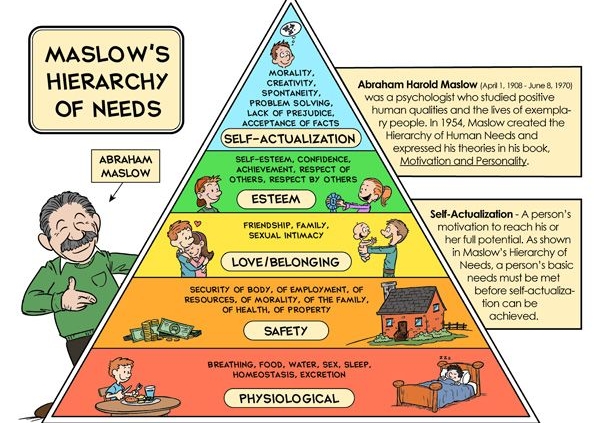Needs vs Wants
The difference between needs versus wants can be very confusing, a moving target. I turn again to Maslow’s hierarchy of needs for reference, not suggesting it’s the only answer or definition, but it is an effective one. I’ve looked at this for a long time, seeing what my true needs were, and where my wants began. That line was very blurry at first. I needed food, shelter, clothing, and with those in mind I therefore needed a job to generate money to be able to buy these things. That goes to the theory and concepts of economics and are part of the core purpose and philosophy of EarthCorp discussed elsewhere.
However as I broke things down, my need for food for example, being a nutritionist and biochemist, I see food differently and I look for specific qualities. I also look for ways to supplement foods because they may be missing certain nutrients. Therefore my wants far exceed my needs in terms of basic food. Could I survive without them? Yes, but I would feel better and perform better and be healthier with them. The saying could be said for clothes, basic clothing could satisfy my knees, however I needed many different types of clothing for different purposes, fancier if I wanted to go out, sportier or performance based for sports, etc. Shelter, a big one. A basic house, protecting me from the elements and providing a place to sleep, cook, etc. Then I might add a bigger piece of land for more privacy or gardens, temperature control for more comfort, more bedrooms for guests, an office, and it keeps going. So in a first world country like the US, my basic needs are perceived to have a higher threshold than what I’ve seen in many countries I’ve worked, from Africa, to Central America and the caribbean. In those cases just the very bare basics are what is thought and many don’t have even that.
So as I continue to analyze all this, and apply it to the principles and goals of EarthCorp that helped evolve the mission statement: elimination of poverty by making environmental regeneration economically appealing. This is accomplished by the creation of jobs, enterprises, and economic development. I say economically appealing because environmentalism is a drain on society as we see it, because it runs counter to the purpose and drive of society which is to make a profit, and all that profit has to come from the planet as its starting point. Human intellect alone doesn’t have value unless it can be converted into something tangible that is sociologically useful. Even a book, written on paper or digitized, must have a medium to transfer that information and all of that comes from our planet. So if it’s not economically appealing, meaning profitable, then it’s not appealing at all in the general terms of society.
As I developed more and more programs and systems, they became more complex, the application of higher technology led to higher cost alongside better performance, but brought many pitfalls as well. A good example is waste to energy, something I’ve looked at since the beginning of EarthCorp in 2001. I watched the technology evolve, get better and better, and more complicated and costly. Pretty soon it became totally out of reach of my purposes because back then it wasn’t intended to make a profit.
I had similar findings in topics like energy production, water production, housing development, and particularly in agriculture. So I stepped back and set out to see what really worked, to meet the basic needs of the project, without going into too many wants. I’m paraphrasing here, it’s not exactly a parallel analysis, but you get the point. If I can produce electricity effectively from solar, and consistently to support a community, even if it’s much lower performance than high tech systems, and I can do it for extremely low cost, with high longevity, and the ability to train anyone how to operate and manage it, it’s a win. I applied that same concept to things like water purification and enhancing agricultural growth.
So as I look back at my history of needs and wants and understandings there too, and the needs and wants of the world at large, it’s given me great clarity in terms of what I need, what the majority of the world needs and wants, and how we can effectively merge the two in a balanced, profitable way.




Leave a Reply
Want to join the discussion?Feel free to contribute!